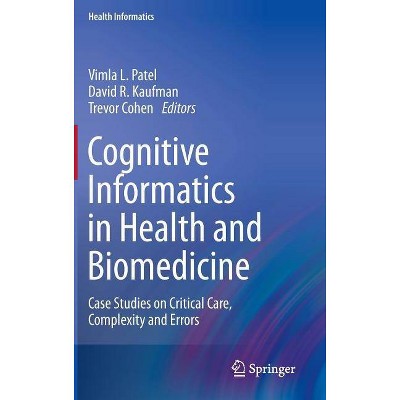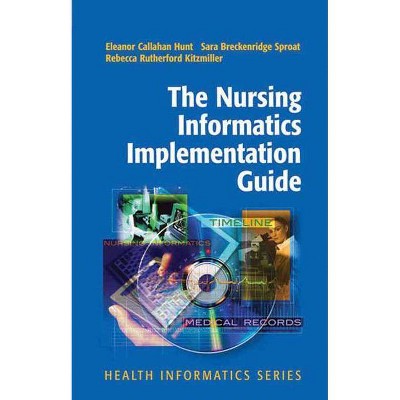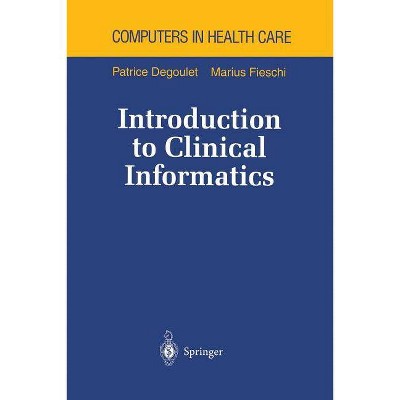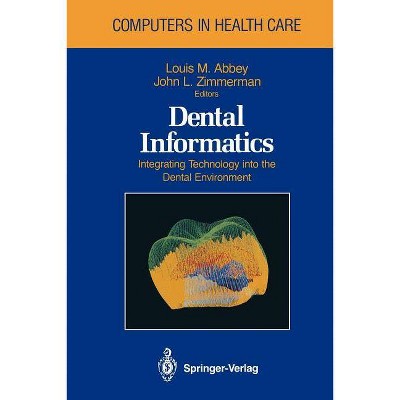Cognitive Informatics in Health and Biomedicine - (Health Informatics) by Vimla L Patel & David R Kaufman & Trevor Cohen (Hardcover)

Similar Products
Products of same category from the store
AllProduct info
<p/><br></br><p><b> About the Book </b></p></br></br>This interdisciplinary book offers an introduction to cognitive informatics, focusing on key examples drawn from the application of methods and theories from cognitive informatics to challenges specific to the practice of critical-care medicine.<p/><br></br><p><b> Book Synopsis </b></p></br></br>Enormous advances in information technology have permeated essentially all facets of life in the past two decades. Formidable challenges remain in fostering tools that enhance productivity but are sensitive to work practices. Cognitive Informatics (CI) is the multidisciplinary study of cognition, information and computational sciences that investigates all facets of human computing including design and computer-mediated intelligent action, thus is strongly grounded in methods and theories from cognitive science. As an applied discipline, it has a close affiliation with human factors and human-computer interaction, and provides a framework for the analysis and modeling of complex human performance in technology-mediated settings and contributes to the design and development of better information systems. In recent years, CI has emerged as a distinct area with special relevance to biomedicine and health care. In addition, it has become a foundation for education and training of health informaticians, the Office of the National Coordinator for Health Information Technology initiating a program including CI as one of its critical elements to support health IT curriculum development. This book represents a first textbook on cognitive informatics and will focus on key examples drawn from the application of methods and theories from CI to challenges pertaining to the practice of critical-care medicine (CCM). Technology is transforming critical care workflows and re-organizing patient care management processes. CCM has proven to be a fertile test bed for theories and methods of cognitive informatics. CI, in turn, has contributed much to our understanding of the factors that result in complexity and patient errors. The topic is strongly interdisciplinary and will be important for individuals from a range of academic and professional backgrounds, including critical care specialists, psychologists, computer scientists, medical informaticians, and anthropologists.<p/><br></br><p><b> From the Back Cover </b></p></br></br><p>This book is the first to address cognitive informatics (CI), a burgeoning discipline that cuts across several academic and professional disciplines. It contains examples drawn from the application of methods and theories from CI to challenges pertaining to the practice of critical care medicine and the management of life-threatening conditions. </p><p><i>Cognitive Informatics in Health and Biomedicine: Case Studies on Critical Care, Complexity and Errors</i> focuses on the unifying themes of cognition, complexity, and the management of error in critical care practice and has been written by distinguished scholars who are leaders in their respective fields. The results reflect the interdisciplinary strengths of cognitive science, and offer a fresh insight into ways to investigate and mitigate errors and the role of health information technology in complex, dynamic environments such as the emergency room and the intensive care unit. The book will be of interest to students and a broad range of researchers in cognitive science, human factors, biomedical informatics, psychology, critical care specialists, computer science, linguists and anthropology.</p><p/><br></br><p><b> Review Quotes </b></p></br></br><br><p>From the book reviews: </p>"'Cognitive Informatics in Health and Biomedicine: Case Studies on Critical Care, Complexity, and Errors' qualifies as required reading for those interested in healthcare safety and quality, for those engaged in clinical care delivery in complex settings, for those interested in understanding cognitive aspects of clinical decision-making, for future researchers investigating clinical errors, and for informaticians planning interventions to reduce the effects of errors." (Randolph A. Miller, Journal of Biomedical Informatics, Vol. 49, 2014)<br><p/><br></br><p><b> About the Author </b></p></br></br><p>Dr Vimla Patel is a Senior Research Scientist and Director of the Center for Cognitive Studies in Medicine and Public Health at the New York Academy of Medicine. Dr. Patel is an accomplished researcher in the areas of biomedical informatics, cognitive psychology and their application in health and medical care settings, especially in the areas of translation of evidence into practice. A leader in adapting methods and theories from cognitive science and in innovating new approaches to translating knowledge into action, Dr. Patel's research explores the role of cognition in designing a safer clinical workplace, the complexity of group decision making underlying critical-care decisions, the generation of medical errors, and the impact of technology on human cognition for competent performance. </p><p>Dr. David R. Kaufman is a visiting Scholar at the New York Academy of Medicine. Dr. Kaufman's primary research interests include human computer interaction in the context of health information technologies, information seeking behavior and decision making in healthcare contexts, and conceptual understanding of biomedical information and decision making by lay people. Trained as an educational psychologist and cognitive scientist, he has conducted several usability evaluation studies with a range of populations. Dr. </p><p>Trevor A. Cohen is an Assistant Professor in the School of Biomedical Informatics at the University of Texas Health Science Center, Houston and is affiliated with the Center for Cognitive Informatics and Decision Making. His primary research interest is in empirical distributional semantics - what machines can learn about meaning from unannotated text - and how this learning relates to human cognition. In addition, he has researched how humans detect and recover from error, in particular medical error.</p>
Price History
Price Archive shows prices from various stores, lets you see history and find the cheapest. There is no actual sale on the website. For all support, inquiry and suggestion messages communication@pricearchive.us




















